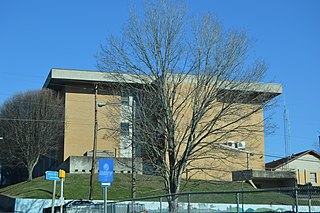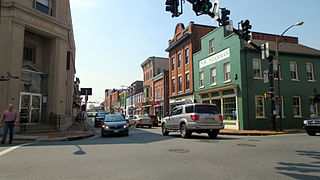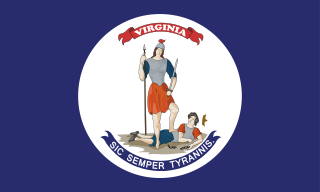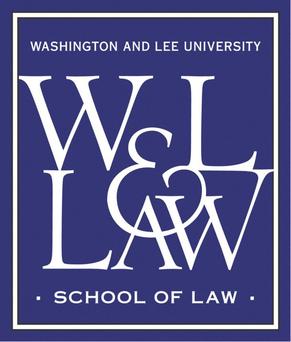
Robert Edward Lee was a Confederate general during the American Civil War, towards the end of which he was appointed the overall commander of the Confederate States Army. He led the Army of Northern Virginia—the Confederacy's most powerful army—from 1862 until its surrender in 1865, earning a reputation as a skilled tactician.

Thomas Jonathan "Stonewall" Jackson was a general officer in the Confederate States Army during the American Civil War. He played a prominent role in nearly all military engagements in the Eastern theater of the war until his death. Military historians regard him as one of the most gifted tactical commanders in U.S. history.

Mingo County is a county in the U.S. state of West Virginia. As of the 2020 census, the population was 23,568. Its county seat and largest city is Williamson. Created in 1895, Mingo is West Virginia's newest county, named for the historic Iroquoian Mingo people.

Lexington is an independent city in the Commonwealth of Virginia. At the 2020 census, the population was 7,320. It is the county seat of Rockbridge County, although the two are separate jurisdictions, and is combined with it for statistical purposes by the Bureau of Economic Analysis. Lexington is about 57 miles (92 km) east of the West Virginia border and is about 50 miles (80 km) north of Roanoke, Virginia. First settled in 1778, Lexington is best known as the home of the Virginia Military Institute and Washington and Lee University.

Lee County is the westernmost county in the U.S. Commonwealth of Virginia. As of the 2020 census, the population was 22,173. Its county seat is Jonesville.

Arlington County is a county in the U.S. state of Virginia. The county is located in Northern Virginia on the southwestern bank of the Potomac River directly across from Washington, D.C. The county is coextensive with the U.S. Census Bureau's census-designated place of Arlington. Arlington County is the second-largest city in the Washington metropolitan area, although it does not have the legal designation of an independent city or incorporated town under Virginia state law.

Leesburg is a town in and the county seat of Loudoun County, Virginia, United States. Settlement in the area began around 1740, which is named for the Lee family, early leaders of the town. Located in the far northeast of the state, in the War of 1812 it was a refuge for important federal documents evacuated from Washington, DC, and in the Civil War, it changed hands several times.

Henry Lee III was an early American Patriot and U.S. politician who served as the ninth Governor of Virginia and as the Virginia Representative to the United States Congress. Lee's service during the American Revolution as a cavalry officer in the Continental Army earned him the nickname by which he is best known, "Light-Horse Harry". He was the father of Robert E. Lee, who led the Army of Northern Virginia against the Union Army during the American Civil War.

William Lyne Wilson was an American politician and lawyer from West Virginia. A Bourbon Democrat, he was elected to the United States Congress in 1882 and served six terms of office, ending in 1895.

George Washington Custis Lee, also known as Custis Lee, was the eldest son of Robert E. Lee and Mary Anna Custis Lee. His grandfather George Washington Custis was the step-grandson and adopted son of George Washington and grandson of Martha Custis Washington. He served as a Confederate general in the American Civil War, primarily as an aide-de-camp to President Jefferson Davis, and succeeded his father as president of Washington and Lee University in Lexington, Virginia.

The Battle of Appomattox Court House, fought in Appomattox County, Virginia, on the morning of April 9, 1865, was one of the last battles of the American Civil War (1861–1865). It was the final engagement of Confederate General in Chief, Robert E. Lee, and his Army of Northern Virginia before they surrendered to the Union Army of the Potomac under the Commanding General of the United States Army, Ulysses S. Grant.

Cheat Mountain is an exceptionally high and rugged ridge situated in the Allegheny Mountains of eastern West Virginia, USA. It is about 50 miles (80 km) long and more than five miles (8 km) wide at its widest. Its highest point is at its southernmost end at Thorny Flat, which has an elevation of 4,848 feet (1,478 m). Several other knobs rise above 4,000 feet (1,200 m) along its length.

The U.S. state of West Virginia was formed out of western Virginia and added to the Union as a direct result of the American Civil War, in which it became the only modern state to have declared its independence from the Confederacy. In the summer of 1861, Union troops, which included a number of newly formed Western Virginia regiments, under General George McClellan, drove off Confederate troops under General Robert E. Lee. This essentially freed Unionists in the northwestern counties of Virginia to form a functioning government of their own as a result of the Wheeling Convention. Before the admission of West Virginia as a state, the government in Wheeling formally claimed jurisdiction over all of Virginia, although from its creation it was firmly committed to the formation of a separate state.

The Battle of Blair Mountain was the largest labor uprising in United States history and the largest armed uprising since the American Civil War. The conflict occurred in Logan County, West Virginia, as part of the Coal Wars, a series of early-20th-century labor disputes in Appalachia. Up to 100 people were killed, and many more arrested.

The eastern theater of the American Civil War consisted of the major military and naval operations in the states of Virginia, West Virginia, Maryland, and Pennsylvania, the District of Columbia, and the coastal fortifications and seaports of North Carolina.

The American state of Virginia became a prominent part of the Confederacy when it joined during the American Civil War. As a Southern slave-holding state, Virginia held the state convention to deal with the secession crisis, and voted against secession on April 4, 1861. Opinion shifted after the Battle of Fort Sumter on April 12, and April 15, when U.S. President Abraham Lincoln called for troops from all states still in the Union to put down the rebellion. For all practical purposes, Virginia joined the Confederacy on April 17, though secession was not officially ratified until May 23. A Unionist government was established in Wheeling and the new state of West Virginia was created by an act of Congress from 50 counties of western Virginia, making it the only state to lose territory as a consequence of the war. Unionism was indeed strong also in other parts of the State, and during the war the Restored Government of Virginia was created as rival to the Confederate Government of Virginia, making it one of the states to have 2 governments during the Civil War.


Jubal Anderson Early was an American lawyer, politician and military officer who served in the Confederate States Army during the Civil War. Trained at the United States Military Academy, Early resigned his United States Army commission after the Second Seminole War and his Virginia military commission after the Mexican–American War, in both cases to practice law and participate in politics. Accepting a Virginia and later Confederate military commission as the American Civil War began, Early fought in the Eastern Theater throughout the conflict. He commanded a division under Generals Stonewall Jackson and Richard S. Ewell, and later commanded a corps.
The 2007 Pittsburgh vs. West Virginia football game, or the 2007 Backyard Brawl as the rivalry is named, was a college football game held in Morgantown, West Virginia that marked the 100th Backyard Brawl. Unranked and 4–7 Pitt, a 28½ point underdog, pulled the upset over archrival WVU who, coming into the game, was ranked second in the BCS and AP Poll and first in the Coaches' Poll. By upsetting West Virginia in the Mountaineers' regular season and home finale, the Panthers knocked WVU out of what had been assured to be their first appearance in a BCS National Championship Game and a shot at their first ever National Championship. The game was one of the most important Backyard Brawls in the series history, one of the biggest upsets in both Pittsburgh and West Virginia history, one of the biggest upsets of the season, and was voted as the "Game of the Year" by ESPNU.

The 2020 West Virginia Democratic presidential primary was held on June 9, 2020 alongside the Georgia primary, as part of the Democratic Party primaries for the 2020 presidential election. It was originally scheduled for May 12, 2020, but was moved to June 9 due to the COVID-19 pandemic. The West Virginia primary was a semi-closed primary, with the state awarding 34 delegates to the 2020 Democratic National Convention, of whom 28 were pledged delegates allocated on the basis of the primary results.





















